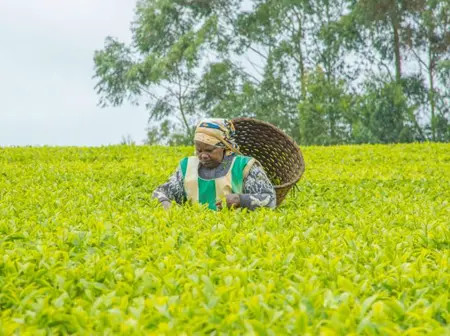The Kenya Tea Development Agency (KTDA) has attributed the drop in earnings in this year’s second payment (popularly known as bonus) for tea farmers to international market conditions and currency exchange movements.
In a statement KTDA noted that in 2024, the Kenya Shilling traded at an average of Kshs 144 to the US dollar, while in 2025 the average was Kshs 129 highlighting that this lower exchange rate meant that even where international prices remained stable, earnings in Kenya Shillings were significantly reduced.
“The drop in earnings is mainly attributed to international market conditions and currency exchange movements that were less favourable compared to last year. In 2024, the Kenya Shilling traded at an average of Kshs 144 to the US dollar, while in 2025 the average was Kshs 129. This weaker exchange rate meant that even where international prices were stable, the amount realized in Kenya Shillings was significantly lower.” Read the statement.
KTDA noted that the average made tea prices across regions reflect this challenge where by in the East of Rift, Kiambu fetched Kshs 371 per kilo, a drop of 46 shillings from last year; Murang’a earned Kshs 376, down by 42 shillings; Nyeri earned Kshs 388, down by 42; Kirinyaga earned Kshs 400, down by 38; Embu earned Kshs 404, down by 34; and Meru earned Kshs 381, down by 46.
In the West of Rift, Kericho fetched Kshs 245, a drop of 101 shillings; Bomet earned Kshs 209, a drop of 85; Nyamira earned Kshs 266, a drop of 106; Kisii earned Kshs 246, a drop of 95; and Nandi/Vihiga earned Kshs 208, a drop of 66.
“These are prices for made tea, and when converted to green leaf using the 4.4 ratio, they explain the reduced farmer playouts across the board.” KTDA noted.
According to KTDA, the differences in second payment between East and West of the Rift are due to quality factors, market dynamics, and cost structures highlighting that teas from certain high-altitude zones naturally fetch better prices because of quality attributes favored in global markets.
The tea agency says some factories were harder hit by suppressed global demand, and operational costs further reducing net earnings, adding that independent producers and plantation companies in the West of Rift, outside KTDA, have reported similar difficulties, confirming that these disparities are market-driven and not unique to KTDA managed factories.
KTDA emphasized that politicizing tea matters only harms farmers. Sustaining incomes depends on quality green leaf, disciplined factory management, and adherence to good agricultural practices.
“It is important that tea is not politicized. Bringing politics into factory operations only harms farmers. The surest way to safeguard incomes is through maintaining high quality green leaf, disciplined factory management, and adherence to good agricultural practices.” KTDA cautioned.
Despite the drop, KTDA outlined ongoing measures to stabilize farmer incomes, that includes; expanding production of orthodox teas, which fetch higher prices in niche markets, to reduce reliance on CTC teas.
Additionally, KTDA is working with government to promote value addition, reduce packaging costs, and open new markets including China as well as investing in factory modernization and energy solutions to cut costs and improve competitiveness.
“We assure our tea farmers that KTDA remains committed to their welfare and to ensuring the long-term sustainability of the sector. The challenges we face are global and systemic, but by focusing on quality, efficiency, and innovation together, we will overcome them and secure better earnings in the future.” KTDA assured farmers.

Leave a Reply